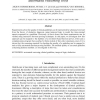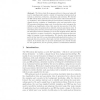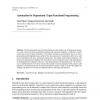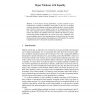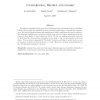265 search results - page 23 / 53 » How to Prove Inductive Theorems |
CORR
2008
Springer
13 years 7 months ago
2008
Springer
Requirements about the quality of clinical guidelines can be represented by schemata borrowed from the theory of abductive diagnosis, using temporal logic to model the time-orient...
ILP
2003
Springer
14 years 26 days ago
2003
Springer
We believe that AI programs written for discovery tasks will need to simultaneously employ a variety of reasoning techniques such as induction, abduction, deduction, calculation an...
FUIN
2010
13 years 5 months ago
2010
Abstract. Writing dependently typed functional programs that capture non-trivial program properties, such as those involving membership, ordering and non-linear arithmetic, is diff...
CADE
2007
Springer
14 years 8 months ago
2007
Springer
Abstract. In most theorem proving applications, a proper treatment of equational theories or equality is mandatory. In this paper we show how to integrate a modern treatment of equ...
TARK
2007
Springer
14 years 1 months ago
2007
Springer
We define a generalized state-space model with interactive unawareness and probabilistic beliefs. Such models are desirable for many potential applications of asymmetric unawaren...
